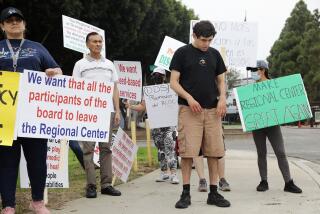Welfare Reformers Watch for Effects of 2-Year-Old N.J. Law : Social services: State withholds additional benefits for women who become pregnant and have babies while on welfare.
- Share via
TRENTON, N.J. — Annette Samuels is marginally aware that she and millions of welfare mothers like her are at the center of a national debate on welfare reform. But she’s only marginally interested.
What’s most important to her is that she’s going to have to give up for adoption her soon-to-be-born fourth child.
Daily survival commands her full attention.
Samuels, 32, lives in Camden, N.J., where industry is a memory and the streets offer few jobs and little safety. When her child is born, the state of New Jersey says the $488 she receives every month to clothe and care for her kids will not be increased.
As lawmakers nationally look at reforming welfare, New Jersey has drawn interest with its 2-year-old law that withholds additional benefits for women who become pregnant and have babies while on welfare.
The change was sponsored by Assemblyman Wayne Bryant, a black Democrat from Camden, who became something of a national celebrity for his striking proposals to crack the “slavery” of the welfare culture.
“The whole value system of poverty is completely out of whack with what we live by, and we have created two different societies,” Bryant said.
Bryant’s “Family Development Program” erased punitive rules that cut benefits if men moved in to form a family. They established--on paper--job training or school programs with transportation to get there, and child care and continued Medicaid coverage if the woman does find a job.
But those programs have not reached Annette Samuels, who is raising three children in a nonprofit shelter run by Volunteers of America. Most of the $720 a month in child support paid by the father of her 6-year-old daughter is kept by the state as reimbursement for past benefits.
The director of the shelter said the cutoff of payments is the only part of the reform that has become a reality for the women there.
“I believe in welfare reform, but everything else that is supposed to be guaranteed should be available, and it is not,” shelter director Pat Federico said.
So when this baby comes, Samuels said in a halting voice, she is giving him up for adoption.
“I know I really can’t afford it because I am barely making it with the three I have,” she said. “Things ain’t getting no cheaper.”
Samuels said she was turned down for job training because she was pregnant, and that Camden County has yet to bring child care or transportation programs on line.
Jacqueline Tencza, spokeswoman for the New Jersey Department of Human Services, said $100 million was set aside to get programs started in eight of the state’s 21 counties, but the process is not complete.
The cutoff of benefits is in effect in all 21 counties, however.
Pregnant women who go on welfare will receive $102 a month when the baby arrives, and $64 a month if it is not the first child.
But under the new program enacted in October, 1992, women who are on welfare already when they become pregnant receive no increased grant when the baby arrives. The cutoff of the $64 benefit kicked in nine months later, on Aug. 1, 1993.
The Department of Human Services said 4,629 babies were born to welfare mothers in the first four months of this year, the most current figures available. That was down 10% from the same four months of 1993, when there were 5,141 babies born into welfare.
The number of welfare families, however, scarcely changed at all, from 123,300 on April 1, 1993, to 122,900 a year later.
Bryant does not like to focus on these figures. He says his aim was not to reduce births, but to introduce normalcy to the family in poverty.
“Welfare is based on a system that is completely upside down from the way the rest of society is,” Bryant said, noting that only in welfare does an adult depend on the presence of children “for their economic viability.”
As for other features of Bryant’s reform, 1,200 women have been able to get off welfare and into a job with the help of state-funded child care and an extension of Medicaid coverage. They represent 1% of welfare families.
One of the welfare mothers who was denied additional benefits was a 21-year-old woman from Elizabeth, who gave birth to triplets in October, 1993. She and six others are the central litigants in a class-action lawsuit brought by Legal Services of New Jersey challenging the elimination of benefits for additional children.
U.S. District Judge Nicholas Politan is expected to decide in coming weeks on whether to issue a quick ruling, known as a summary judgment, on the “$64 question,” or schedule a full trial next year.
Meanwhile, New Jersey activists fear that federal “reforms” being contemplated will amount to cuts, which they say will trigger dramatic suffering in a state with a high cost of living, such as New Jersey.
“People are being real creative to stay off the street as it is,” said housing activist Michael Ring of Elizabeth. “People really amaze me with their resourcefulness, but a lot of them are exhausted. They have done all they could.”
More to Read
Get the L.A. Times Politics newsletter
Deeply reported insights into legislation, politics and policy from Sacramento, Washington and beyond. In your inbox twice per week.
You may occasionally receive promotional content from the Los Angeles Times.










